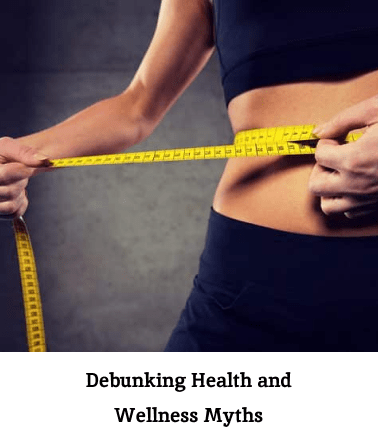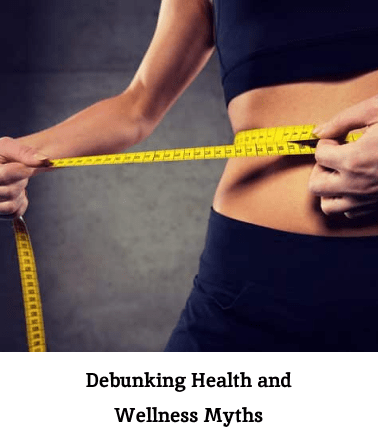Debunking Health and Wellness Myths

At georgetownsuncryo.com/ there’s an abundance of information surrounding health and wellness myths. However, in today’s saturated online landscape, it’s crucial to discern between fact and fiction. We, as purveyors of accurate information, aim to debunk common misconceptions, providing a comprehensive guide to separate truth from fallacy in the realm of health and wellness.
Understanding Health and Wellness Myths
Unraveling Misconceptions:
Misinformation often thrives in the health and wellness domain, leading individuals astray. From “Detox Diets Flush Out Toxins” to “Fat-Free Equals Healthy,” these myths persist, impacting people’s decisions about their well-being.
Debunking detox diets:
Detox diets, often marketed as a way to cleanse the body, lack scientific evidence. Contrary to popular belief, our bodies have efficient detoxification mechanisms involving the liver and kidneys. Diets claiming to flush out toxins may instead deprive the body of essential nutrients.
The Truth About Fat-Free Products:
While fat-free products might seem healthier, they often compensate with higher sugar or artificial additives. Healthy fats, found in avocados and nuts, are essential for bodily functions. Moderation and balance are key, rather than strictly opting for fat-free alternatives.
Dispelling Exercise Myths
Clarifying Exercise Notions:
Exercise misconceptions can hinder progress toward fitness goals. Separating facts from fiction is crucial for an effective workout regimen.
Spot Reduction Myth:
Contrary to popular belief, targeted exercises don’t guarantee fat loss in specific areas. Comprehensive workouts and a balanced diet contribute to overall fat reduction rather than spot reduction.
The “No Pain, No Gain” Fallacy:
While some discomfort during exercise is normal, pain is not indicative of progress. Pushing beyond limits can lead to injury, emphasizing the importance of listening to the body’s signals during workouts.
Nutrition: Unveiling Diet Myths
Navigating Dietary Misconceptions:
Dietary myths often influence eating habits. Recognizing these fallacies is crucial for making informed nutritional choices.
Myth of Skipping Meals for Weight Loss:
Skipping meals doesn’t equate to weight loss. It can lead to increased hunger, overeating, and slowed metabolism. Regular, balanced meals support a healthy metabolism and sustainable weight management.
Myth of Carbohydrates Being “Bad”:
Carbohydrates often receive negative attention in dieting discussions. However, not all carbs are detrimental. Whole grains, fruits, and vegetables provide essential nutrients and energy crucial for overall well-being.
Holistic Wellness Myths
Holistic Wellness: A Closer Look
The holistic wellness sphere encompasses mental, emotional, and physical health. It’s essential to dismantle myths to foster a balanced understanding.
Mental health stigma:
Myths surrounding mental health perpetuate stigma. Addressing mental health concerns requires empathy and understanding, not judgment or misconceptions.
“Natural” equals “safe“:
The belief that natural remedies are always safe overlooks potential risks. Natural doesn’t necessarily mean harmless. Consulting healthcare professionals ensures informed choices.
Conclusion
Separating truth from myths is pivotal in making informed decisions regarding health and wellness. By dispelling common misconceptions, individuals can navigate the overwhelming abundance of information more effectively.
